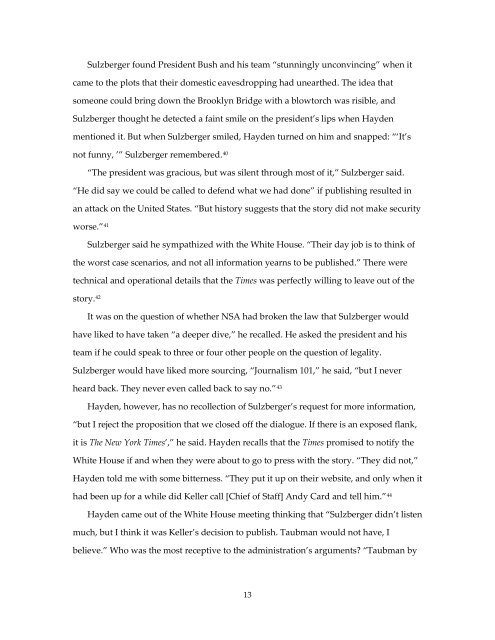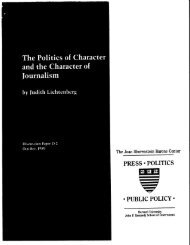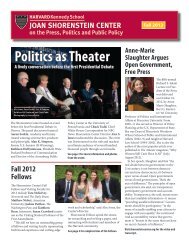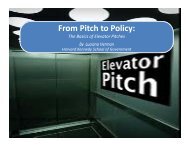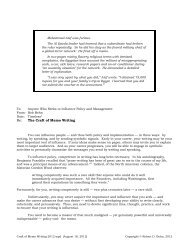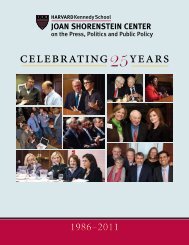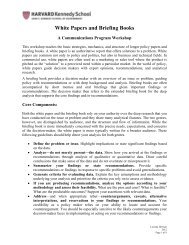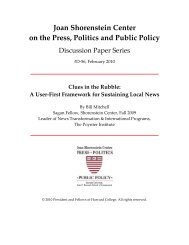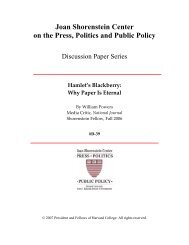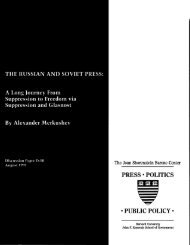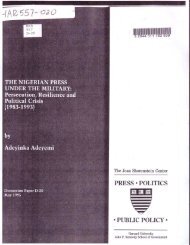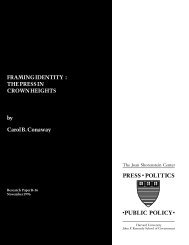Anatomy of a Secret - Harvard Kennedy School
Anatomy of a Secret - Harvard Kennedy School
Anatomy of a Secret - Harvard Kennedy School
Create successful ePaper yourself
Turn your PDF publications into a flip-book with our unique Google optimized e-Paper software.
Sulzberger found President Bush and his team “stunningly unconvincing” when it<br />
came to the plots that their domestic eavesdropping had unearthed. The idea that<br />
someone could bring down the Brooklyn Bridge with a blowtorch was risible, and<br />
Sulzberger thought he detected a faint smile on the president’s lips when Hayden<br />
mentioned it. But when Sulzberger smiled, Hayden turned on him and snapped: “‘It’s<br />
not funny, ’” Sulzberger remembered. 40<br />
“The president was gracious, but was silent through most <strong>of</strong> it,” Sulzberger said.<br />
“He did say we could be called to defend what we had done” if publishing resulted in<br />
an attack on the United States. “But history suggests that the story did not make security<br />
worse.” 41<br />
Sulzberger said he sympathized with the White House. “Their day job is to think <strong>of</strong><br />
the worst case scenarios, and not all information yearns to be published.” There were<br />
technical and operational details that the Times was perfectly willing to leave out <strong>of</strong> the<br />
story. 42<br />
It was on the question <strong>of</strong> whether NSA had broken the law that Sulzberger would<br />
have liked to have taken “a deeper dive,” he recalled. He asked the president and his<br />
team if he could speak to three or four other people on the question <strong>of</strong> legality.<br />
Sulzberger would have liked more sourcing, “Journalism 101,” he said, “but I never<br />
heard back. They never even called back to say no.” 43<br />
Hayden, however, has no recollection <strong>of</strong> Sulzberger’s request for more information,<br />
“but I reject the proposition that we closed <strong>of</strong>f the dialogue. If there is an exposed flank,<br />
it is The New York Times’,” he said. Hayden recalls that the Times promised to notify the<br />
White House if and when they were about to go to press with the story. “They did not,”<br />
Hayden told me with some bitterness. “They put it up on their website, and only when it<br />
had been up for a while did Keller call [Chief <strong>of</strong> Staff] Andy Card and tell him.” 44<br />
Hayden came out <strong>of</strong> the White House meeting thinking that “Sulzberger didn’t listen<br />
much, but I think it was Keller’s decision to publish. Taubman would not have, I<br />
believe.” Who was the most receptive to the administration’s arguments? “Taubman by<br />
13


